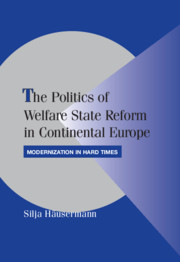Book contents
- Frontmatter
- Contents
- List of Figures
- List of Tables
- Preface
- The Politics of Welfare State Reform in Continental Europe
- 1 “EPPUR SI MUOVE”: WELFARE STATE CHANGE DESPITE INSTITUTIONAL INERTIA
- 2 MODERNIZATION IN HARD TIMES: THE POST-INDUSTRIAL POLITICS OF CONTINENTAL WELFARE STATE REFORM
- Part I Pension Reform in Continental Europe: A Framework of Analysis
- 3 A NEW REFORM AGENDA: OLD-AGE SECURITY IN THE POST-INDUSTRIAL ERA
- 4 CHANGING ALLIANCES: CONFLICT LINES AND ACTOR CONFIGURATIONS
- 5 REFORM OUTPUTS: STRATEGIES OF COALITIONAL ENGINEERING
- Part II Determinants of Successful Pension Reform in Continental Europe
- Appendices
- References
- Index
- Cambridge Studies in Comparative Politics
4 - CHANGING ALLIANCES: CONFLICT LINES AND ACTOR CONFIGURATIONS
Published online by Cambridge University Press: 06 July 2010
- Frontmatter
- Contents
- List of Figures
- List of Tables
- Preface
- The Politics of Welfare State Reform in Continental Europe
- 1 “EPPUR SI MUOVE”: WELFARE STATE CHANGE DESPITE INSTITUTIONAL INERTIA
- 2 MODERNIZATION IN HARD TIMES: THE POST-INDUSTRIAL POLITICS OF CONTINENTAL WELFARE STATE REFORM
- Part I Pension Reform in Continental Europe: A Framework of Analysis
- 3 A NEW REFORM AGENDA: OLD-AGE SECURITY IN THE POST-INDUSTRIAL ERA
- 4 CHANGING ALLIANCES: CONFLICT LINES AND ACTOR CONFIGURATIONS
- 5 REFORM OUTPUTS: STRATEGIES OF COALITIONAL ENGINEERING
- Part II Determinants of Successful Pension Reform in Continental Europe
- Appendices
- References
- Index
- Cambridge Studies in Comparative Politics
Summary
So far, this book has introduced the four conflict dimensions in post-industrial pension policy making. Each of these dimensions entails a specific configuration of winners and losers with particular risk profiles: the divide between employees and employers points out winners and losers in conflicts over insurance; skill level and firm size delineate the winners and losers in matters of capitalization; and labor market status and values bear strongly on the interest profile of individuals with regard to targeting and recalibration. Hence, while actors' positions on insurance are class related, the three other reform dimensions divide winners and losers along conflict lines that cut across labor and capital. We can thus expect post-industrial pension politics to give rise to multiple crosscutting conflict lines, thereby generating a variety of class and cross-class alliances in the pension policy process. This is the second hypothesis of the analytical framework of this book, and it is developed in detail in this chapter.
The analytic step from sociostructural risk profiles to political divides in the policy-making processes of France, Germany, and Switzerland must be theorized. To become an actual conflict in pension politics, each of the potential antagonisms needs to be mobilized by collective political actors interested in change and powerful enough to be heard. Hence, the key question in this chapter is, Who speaks on behalf of these different risk profiles? That is, Who articulates these potential conflict lines in the actual policy making arenas of the different countries?
- Type
- Chapter
- Information
- The Politics of Welfare State Reform in Continental EuropeModernization in Hard Times, pp. 56 - 79Publisher: Cambridge University PressPrint publication year: 2010

